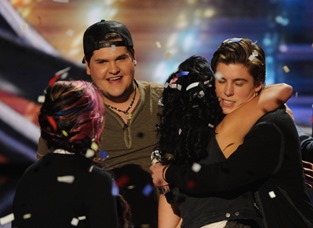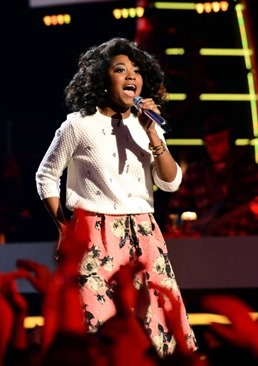From his first appearance as judge on American Idol (Fox, Tuesdays, 8/7C; Wednesdays 9/8C), Keith Urban has consistently been the kindest judge in terms of giving honest critiques without being mean. He also balances touring, and family with his AI gig, so he’s a pretty busty guy.
Recently, he took a bit of time to talk with a group of bloggers about American Idol XIII and was, as usual, charming and open.
Keith Urban: Hi, everybody!
Hey, Keith! I wanted to ask you about the country music being represented in the show. I mean, I have been watching since Season One and, of course we had Carrie and we had Scott McCreery, who has been kind of like a mild success story, but you know this year you have a lot more country music being represented, not only in the talent, but in the songs that are being chosen. Is that like a conscious effort? I mean, your being a judge too and country music, talk to me about how it is being represented and if you are happy with the talent that’s there this year.
Keith: Well, I think country has always been fairly well represented. I think it might be a little more prominent now. I don’t know if that’s because I’m there or what it is. Last year was good with that too, and this year I like that we’ve got diversity in the country area this year because you’ve got somebody like C.J. who can fit into that genre. You’ve got someone like Jessica that can fit in that genre. And I like the diversity that we’ve got. I also think that Idol has always played very, very well in those places, Midwest and the sort of rural states that have huge country audiences, so I am really grateful to be on the panel because of that, and hopefully we can discover some exceptional country talent this year too.
Definitely. Do you remember your first audition song since they’re doing that tonight?
Keith: Do I remember what, sorry?
Your first audition song, since they are doing that theme tonight?
Keith: Oh, I didn’t have to sing for my job on Idol. My first audition song – I don’t know where that would’ve been. I don’t know if I’ve ever had to sing an audition song. Certainly, I did a few of these shows when I was very young in Australia. I think when I was nine was the first time I went on, and I think I did a song called, I think I did a song called “Lights on the Hill” which is a country song by Slim Dusty, and that probably would be my first audition song.
I just recently read in a People magazine article that you did that you are now bringing your kids to the set occasionally with you. I was wondering, what kind of music do they really like?
Keith: Well, they love “Let It Go”, of course by Frozen, right now that’s the number one song, but they like all sorts of stuff. They tend to just sing to whatever is on the radio. We play the radio a lot in the car and they respond to different things, but up-tempo things they particularly love, both of them. Sunday is 5 ½ and Faith is 3, so you never know what they are going to be cranking in their room. They have an iPod in their room that they play a lot, so I love that there is music coming from their bedroom all the time.
When you watch the contestants on the show, because of your background in country, do you find that you have a preference for them or are you able to be objective and look at all the different types of musical contestants equally?
Keith: Oh, absolutely equally! I just respond to feeling. It’s not even about genre; it’s got nothing to do with genre. It’s got everything to do with the sense of believability and authenticity and a feeling. It could be a non-genre. It could be something someone comes in and performs that doesn’t really fit any particular genre, but I am just going to react and respond to how it makes me feel.
Who do you think is the front runner this season and why?
Keith: I’ve got asked that question at the end of the show last Thursday night and I truly can’t say, I don’t really know at this stage. I don’t have a personal front runner because we’ve already seen, for me, the surprise of who ends up in the bottom three each week and it’s not really been consistent. So I think what I am liking about this season is America’s responding to the performances from night to night. It doesn’t seem like there is such an intense fan club for any particular artist where those will override the performance and I like that. I think that’s what makes the show interesting for me from week to week right now, is anybody can be the front runner. So it’s going to be interesting to see who’s in the top three, let alone, one and two. I really don’t know who that will be.
Would you let your kids go into showbiz, and why or why not?
Keith: Absolutely! If they are willing to work for it, if they have an aptitude towards it and a real desire to work towards really anything, whatever they have a passion for, they just need to work at it. That’s the big thing that I find constantly with Idol even, is that it’s not just about having the talent, it’s about having the passion for it.
And do they seem to have a passion for showbiz, singing or anything at this point?
Keith: I don’t know about that, I mean, Sunday is only 5 ½ so, they both sing and dance a little bit around the house. But who knows, I mean they might go into acting-there’s a little bit of that in our house. There’s a little bit of music in our house – who knows where they will go.
I just wanted to ask about the contestants making the transition to the big stage, have you seen any challenges with that this year on their part?
Keith: Definitely. I think it’s one of those places where you can be very, very young, 15, 16, 17, and have a great voice, be a great singer, have a good look, be everything like that, but if you don’t have any experience in front of an audience, it can really throw you and I think we have seen that a little bit this year. I notice even from rehearsal to the show that night, it’s a particular thing to be able to perform in front of an audience with the energy and the cameras on and all that sort of stuff.
It’s been an interesting group, because now I am watching a lot of them really rise to that. I think the very first show threw a lot of them, and then the second week got a little easier for them and I think most of them are in their groove now and we are seeing that consistency starting to rise.
As far as the elimination so far, MK and Majesty, do you think it was their time to go or would you have liked to have seen them around a little bit longer?
Keith: It’s tricky because on one hand, if we don’t use the save, everybody boos us, but you could really answer it also by saying we agree with America, because that’s why they’re singing because they are at the bottom based on everybody’s votes. I think so far, the three of us haven’t agreed across the board on saving somebody, so in a couple of cases, at least one of us would’ve wanted to save that person, but I think we are really coming down to the wire now, so this week or next, it will be interesting to see who we have to use our save for.
So tonight, I have been following Dexter Roberts obviously because I write about country music, so tonight Dexter is going to do the Casey James “I Like to Drive” and I think Dexter has made really good song choices all season, so can you just talk about how much song choice matters when it gets down to the bitter end like this.
Keith: Song choice matters a lot for some more than others. I mean, I think there are some artists in this group who can sing most things, and I think their vocal and their artistry comes through no matter what they are singing. But I think other ones really have to pick their songs carefully to play to their strengths. I think we saw that with Ben Briley choosing a song that didn’t quite fit who he was and what he was doing. So it’s tricky, because I know it can seem contradictory that we ask for everybody to show us something different, but you also have to know how to be different and still remain yourself, you know, it’s not just different for different sakes. It’s showing another side of you; not just this complete other thing that’s got nothing to do with who you are, so I think song choice is particularly crucial especially as we go into these last eight weeks.
Right, right. And we are getting so close to the end, so when you look at all the winners who have come before, is there anything, like, when you think about what will happen on May 22nd when it’s all over and there’s a winner, if you were going to give that person advice on how to move forward, because the post-Idol success is not always at the Carrie Underwood, Kelly Clarkson level. So what advice would you give the winner?
Keith: For me, it’s the same advice across the board. It’s the same advice for the person who came 8th. You know, it’s the person who goes home tonight. It’s all the same advice which is it’s what you do with this going forward now that’s going to make it either work or not work, because winning Idol doesn’t automatically catapult you into the stratosphere. You have to then set about finding the songs and making a record, then you’ve got to go out and do all the interviews. You’ve got to be able to do all the work. It can get you to the front of the line a little quicker, but it doesn’t mean that it’s going to happen right away.
It has been interesting with this show that over the years we’ve seen just as much success come from the non-winners as the winners. So I think that’s also testament to the people that that judges have chosen over the years, obviously the Chris Daughtry’s and the Adam Lambert’s and the Jennifer Hudson’s, etc. who have gone on to have exceptional careers, so it’s really what you make of it after the fact.
I was wondering if you think this year’s more open ended themes have had an impact on performances as opposed to past seasons.
Keith: I think that at the end of the day, you’ve still got to choose the right song and no matter what the themes are, each one of these guys and girls has to figure out how to choose something within the theme that still works for them and plays to their strengths. Some can do that better than others. I think that is what we have seen.
And do you feel that now that you are sitting on the panel with Harry Connick and Jennifer Lopez, has that changed your own approach to judging in any way?
Keith: Not at all, no. I mean, I respond to what I feel, what I see. I don’t overthink it. I respond to something. The only time for me it gets sort of into the thought is like if I can then pinpoint what it is that I am missing in this performance and how they might be able to fix it. I mean in some cases you’ve got people that just hit a wall, you can just see they’ve hit a wall where they now need to go and live life. And they need to keep either writing songs or they need to keep performing live; they need to do something, but now they just need all the experience. And I find that there is not a lot of advice that you can give other than you’ve just got to get out there and live life and it’s just going to take some time now.
I think that is what happened to Majesty last week, is that we felt like we were starting to see the same thing. And she’s got an extraordinary talent, she really is gifted, but she now needs life. She just needs to get out there and really define who she is and find herself as an artist.
I wanted to know, switching gears a little bit, your, [indiscernible] tickets go on sale this Friday, can you talk about this year’s theme and concept storytellers and how that came about or who helped in selecting that and the people that you chose to be a part of this.
Keith: Yeah, this will be the 5th year that we have done it and I look for a different theme every year. There are a lot of reasons for that- one is just so that there is something different every year for the audiences coming. But also it helps me figure out a guest list, if you will, because every year my dream list is way too big for what we can actually take on the night, so trimming it down is always difficult.
So this year I came up with the idea for song tellers and it was really just a way for the audiences to get to hear some stories about the songs, because this isn’t just about song writers telling the story, this is artists like say Reba McEntire or somebody like that that doesn’t write songs, and we’ve never really heard much about why she chooses certain songs, why did she record a certain song. Maybe she had to fight some other artist to record it, I mean I think there is a lot of cool stories about why artists cut songs, why they record them, why they choose them, what the songs mean to them. So this year was just an opportunity for the audiences to hear some of these stories behind the songs.
And on a different note, we have heard you talk a little bit about your upcoming Raise ‘em up Tour and it sounds to me like things are pretty wide open when it comes to you being able to choose a set list because you’ve mentioned album cuts and obscure tracks, so talk about the challenge of putting together this set list and what are you using as sort of a guide to decide which of those songs are going to make it.
Keith: I mean, I find the biggest challenge is the same one each year. Thank God it’s a beautiful problem, is that there is x-amount of songs that people want to hear but we’ve only got, you know, a couple of hours to play within, you know 2 or 3 hours whatever it is. What I am trying to figure out is which of the songs people would be really, really upset if we didn’t do and which of the ones that people who have seen us over and over again would be happy to leave out of the set list and instead replace with something new. So that’s what I am in the midst of right now, is figuring out which of the older songs do we absolutely, positively have to have in there regardless, and then from there, threading in some sort of obscure ones and certainly a lot of songs off Fuse. I mean so far, I think the set list is going to feature a good chunk of songs off of Fuse simply because of the feedback I have been getting from a lot of people on songs on that record they want to hear.
I wanted to see your opinion on MK and her story is, because she is the first LGBT contestant, you know been in the competition before, you know while they are in the competition. So what did you think of her and what do you think of her story and is the story more important than singing?
Keith: Well I mean the story is beautiful and it’s very inspiring. I think she is, as far as a singer, she has a really beautiful voice and I think where MK hit a wall with the show was simply in regards to the performance and the fact that it is a visual medium too, it’s not just audible. And some sort of visual way of performing is really important. It doesn’t mean running around the stage, it just means performing in such a way that it sort of like goes through the camera and connects with people. I think she is obviously going to keep working on this because she is really, really gifted, so I will be interested to hear more from her.
Your wife recently told Jimmy Kimmel that you started teaching Faith to play the guitar. I was wondering how her lessons are going and if you critique her like you do the Idols or if you are easier on her since she is so young.
Keith: I don’t know if I really am teaching her to play guitar, but she can sort of mimic a little bit of what I am doing strumming-wise. That’s really what I am trying to teach her, she’s only 3. But what I love is how she gravitates towards the guitar. She’s got a little pink guitar, she will go get it and hold it and she sits with it right, and she strums with it right, and I hope she keeps going with that because it does seem to be something that she reaches for.
I wanted to backtrack a little bit and ask you, when Idol approached you about being a judge, what did you consider as the pros and cons and what was the most important thing you wanted to give to the contestants?
Keith: Well I mean, the most important thing I wanted to be able to do was help them, because a lot of the times I see artists struggling with something that is very simple to fix and Harry’s the same. In my case, it’s things that I’ve had to figure out how to do, how to perform properly, how to choose songs properly, just a myriad of things and I think a lot of that can be taught. You have to have an intrinsic talent to start with, you really just do have to have a sort of a gift and then hopefully the work ethic that goes with that is crucial. If you are interested in growing and learning and listening, then I think a show like this particularly can be extremely helpful.
I love that part of it more than anything and then watching it from week to week to see if they’re listening to some of the advice that works for them, because it’s not about just listening to every piece of advice. It’s about listening and registering the ones that feel right and discarding the rest, because it’s not all truth, it’s not all accurate for each person. We’ve all got our opinions of what they should be doing, but they’re an artist and they’ve got to decipher what that is. But I love watching from week to week seeing that growth. It’s really extraordinary.
Well it’s really funny because my followup question was what skills do you think they’re taking away from this experience, but given that you know the recording process, you know the live process, what do think is maybe the single most important skill that they can apply to their music from now on?
Keith: I don’t know if that’s a blanket sort of piece of advice. I think it’s always different for each person and everybody’s in different places on their artistic journey. And it’s a contradiction in terms too, because we can be offering all this advice, but they also have individualism and originality about them, which can defy every single thing we are saying. They could go against every single thing and create something extraordinary. So, you know, that’s the beauty of art, there’s no rules to it. There’s just the creation of the art and then there’s the response from it. And that’s the only thing that’s true, is how people respond to it.
I was wondering about the save and you’ve had to deliberate on several contestants so far, and I was wondering what your personal criteria is for using it on a contestant.
Keith: Well there’s a lot of them really. One of them is do we think this artist is growing and this was just a particularly ill-chosen song or an unfortunate performance and they’re much better than that. In which case, we feel like there is much more to them yet to be seen, we should save them, we think we think the audience will like them next week if they get the right song.
I mean, the other one is that other people left in the group who we’re worried might end up being in that bottom and we’ll have to save them. So part of that factors into that too, and there’s just that reality of the person performing and if they just do an absolutely, knock it out of the park performance, we’re all going to deliberate really quick and probably change our minds and I think it’s a little bit of what was happening last week with Majesty. We really couldn’t decide on that, so I am looking forward to us hitting a unanimous decision before too long.
Also what do you make of only one guy being voted off so far?
Keith: I don’t know what to make of it, I mean, it’s just the way people are voting. Everybody’s performing and everybody’s responding and voting accordingly, so what I find interesting more so is the fact that nobody seems immune to being in the bottom three. I mean you’ve got somebody like Sam that seems to have an absolute army of devoted female fans and yet he can end up in the bottom three as well if he does a sort of subpar performance. That part has been interesting to watch this year from week to week.
Thank you, everybody, for phoning in and for having this chat this morning. I appreciate it.
Photos by Michael Becker and Frank Micelotta/Courtesy of Fox



